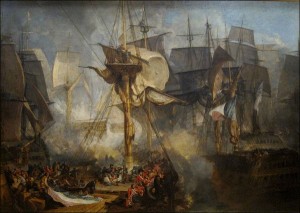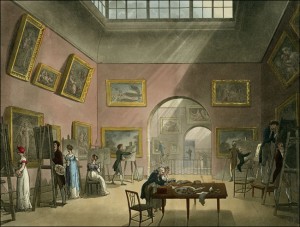All links are to Wikipedia entries.

The Battle of Trafalgar, as Seen from the Mizen Starboard Shrouds of the Victory by J.M.W. Turner. (Click on image to see a larger version.)
Government, Politics, and War:
- May: Napoleon is crowned, by himself, as King of Italy at the Cathedral of Milan
- July 9: Muhammad Ali Pasha (the “founder of Modern Egypt”) becomes the Ottoman Viceroy in Egypt. His “dynasty” will rule Egypt until 1952.
- July 22: The British defeat the Franco-Spanish fleet at the Battle of Cape Finisterre.
- October 19: A decisive French victory at the Battle of Ulm culminates in the surrender of the entire Austrian army.
- October 21: At the Battle of Trafalgar, the British Royal Navy defeats the combined French and Spanish fleet in the most decisive naval battle of the Napoleonic Wars, effectively ending French pretensions as a sea power. Admiral Lord Nelson dies in the battle, and is still considered the greatest naval hero in British history.
- November 6: News of the victory at Trafalgar and Nelson’s death reaches London.
- December 2: Napoleon defeats the Russian and Austrian armies at the Battle of Austerlitz.
- December 4: Truce is signed between France and Austria.
- December 26: The Peace of Pressburg is signed between France and Austria.
Society and Social History:
- The Bow Street Horse Patrol, a mounted law enforcement force, is revived in London. A horse patrol had been established in the 1760s, but lasted just over a year due to lack of funding.
- August 3: The first annual cricket match between Eton and Harrow is held at Lord’s Cricket Ground. The young Lord Byron is on the losing Harrow team.
- December: The French Republican Calendar is abandoned, and France returns to the Gregorian calendar.
Literature, Journalism, and Publishing:
- William Blake publishes Milton.
- Maria Edgeworth publishes The Modern Griselda.

The British Institution from Ackermann’s Microcosm of London. (Click on image to see a larger version.)
Art, Architecture, and Design:
- Thomas Sheraton publishes the “Cabinet Maker, Upholsterer and General Artist’s Encyclopaedia”.
- June: The British Institution (in full, the British Institution for Promoting the Fine Arts under the Patronage of His Majesty) is founded by a group of connoisseurs who organize exhibitions and competitions.
Music:
- April 7: Beethoven‘s Symphony No. 3, Eroica is premiered in Vienna.
- November: Beethoven’s opera Fidelio (under the name Leonore) premiers in Vienna.
Science and Industry:
- January 20: The London Docks open at Wapping.
- November 26: The Ellesmere Canal’s Pontcysyllte Aqueduct is opened in Wales, the tallest and longest aqueduct in Britain.
Natural History and Exploration:
- November 7: The Lewis and Clark Expedition arrives at the Pacific Ocean.




